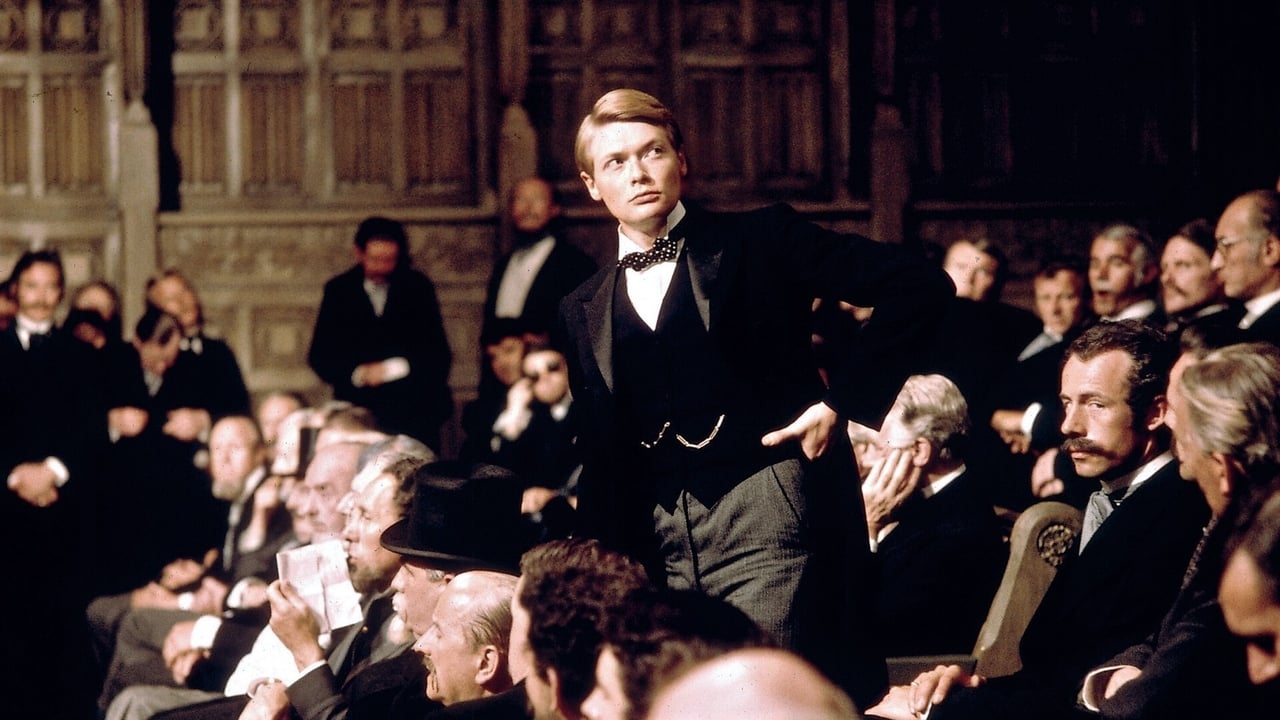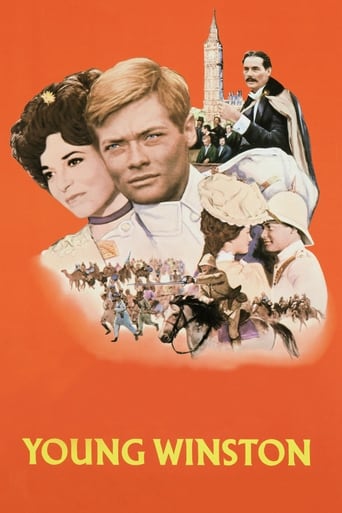

In the second half of the twentieth century the biographical epic came into its own. The past hundred years had thrown up a lot of inspirational figures in politics and war, and as that generation of heroes began to die off, and the big motion picture developed an intimate streak, high-budget biopics became a matter of course. And, like anything that is produced often, there soon becomes a standard way of doing it.The writer of Young Winston was Carl Foreman, of High Noon and Bridge on the River Kwai fame. He had a strong starting point – the writings of Churchill himself, full of the man's sense with words and subtle humour. Foreman structures the first book of Churchill's biography into a coherent and entertaining screenplay – sensibly opening with a burst of action from a period in Churchill's adulthood, which not only hooks the audience but also gives us a promise that this adventuresome time will be returned to later. This is especially important since there are moments in the first hour or so where Young Winston threatens to become a dry, domestic biography. But Foreman makes an error in his striving to get various supporting details across. There are several of these bizarre "interview" segments, where major characters are grilled by an unseen questioner, clunkily breaking up the flow of the story. The revelations in the interviews are important, but a writer of Foreman's calibre should have known better and woven them into the regular narrative.Foreman also produced, and he selected Richard Attenborough on the strength of his debut Oh! What a Lovely War. Attenborough seems perhaps a little overwhelmed by all the gadgetry of a larger production. His work looks pretty, but doesn't seem to have much point to it, especially the many slow zooms which become a little irritating. Still, there is his ability to create memorable and iconic imagery, both of actors and of landscapes. He also takes care to make the final shot of one scene dovetail somehow into the first shot of the next. For example a slow tilt upwards following Anne Bancroft on a staircase cuts to an opposing downward tilt to bring us in on the teenage Churchill's speech in the school hall. Such smooth linking devices are useful in a picture like this that has many sudden changes in place and tone.Attenborough was apparently also chosen for his ability to pick a decent cast. He pushed hard for Simon Ward in the title role, and on the whole made a good choice. The fresh-faced Ward deftly depicts Churchill's transition from eager teen to levelheaded military officer. However his adoption of the real Churchill's famous mannerisms and speech patterns in the final scenes verges on the ridiculous. Anne Bancroft gives a steady performance as his mother, although she is perhaps too good at playing cold-hearted women, and when her character's tenderness begins to sour towards the end of the picture it suddenly appears Lady Churchill is going to turn into Mrs Robinson. The finest turn is that of Robert Shaw as Winston's father. He makes Lord Churchill's descent into syphilis-induced dementia poignantly real – you can see the man he was in there still, disintegrating. There are also plenty of big name cameos, but frankly these are far too brief to be of any note or impact on the picture.So, altogether a mixed-bag of a life story. Everything we need to know is there, it just seems that on all accounts this was not a very cohesive effort, in which script, performances and general production have no particular aim or arc. As such, there are some great set pieces, and considered in bits most of Young Winston is very well done. As a whole however, it has neither the sweep nor the power to give us the impression of a life lived.
... View MoreI saw the British version in 1973 in Oxford, UK, the evening after my first visit to Blenham. About 15 years later I purchased the American VHS version and discovered a vital 5 minute epilog is missing from the American. In the epilog, the portly, now retired Churchill is snoozing at his painting easel. The ghost of his long-dead father Lord Randolph shows up for a conversation. The father is vitally interested in how the young chaps of Edwardian England, such as Chamberlain, made out and did they reach 10 Downing? The sleeping Winston, in the tones of Simon Ward's voice-over, explains that "yes, such men reached the P.M.'s office." Before leaving, Lord Randolph finally asks Winston what he did with his life? Modestly, Churchill says he's written several books and Lord Randolph, with a touch of patronizing, approves, after all any larger greatness was probably out of reach for his limited son. The audience at Oxford was almost standing on their chairs screaming "Tell the bastard you saved Western Civilization!!!" A far more powerful ending than young Winston making his first political mark after his Boer War adventures.
... View MoreThis was an excellent and engaging film about the early years of Winston Churchill. The acting and writing were superb. The directing was generally good as was the writing, though there were a few moments when the movie was a bit slow or skipped over a little too much of his life--though certainly not in the last half of the movie when he is involved in the Boer War. About my only serious gripe about the movie was that once it was finished, I was left wanting to know more. This would have been a much better mini-series than a movie. That's because I think the movie attempted to do too much in too little time. However, what it did do, it did very well and the movie offers excellent insight into the man's formative years.
... View MoreThe picture is based on Winston Churchill's autobiographic book titled : ¨My early life : a roving commission¨ . The movie talks about infancy , the school times in a strict discipline , the young military and journalist career and the election as parliamentary at the early age twenty six years old . He intervened against the rebels in India , at defense of the British Empire . Winston participated in the last charge of Brit brigade in Sudan war along with general Kitchener (John Mills) in command the Army against Derviches that had formerly vanquished general Gordon (1884 , Khartoum, events narrated in the film with the same title with Charlton Heston). Later on , he was to South Africa as journalist in English-Boer war (1899-1902 , the leaders were Rhodes-Kruger respectively) that Kitchener would finish (though there he would create the first concentration camp) . Churchill is imprisoned but he breaks out from Pretoria . After the spectacular getaway which obtained world fame he was elected as Parliament member where he speaks an overlong speech that makes it a little bit boring . He subsequently becomes Tory (or Conservative) Party leader confronting Prime Minister Salisbury (Laurence Naismith) and later on , facing LLoyd George (Anthony Hopkins) , Liberal Party leader . The film won several Oscar nominations or Academy Awards , to original screenplay (Carl Foreman), Production design (Geoffrey Drake) and Costume (Anthony Mendleson) but achieve none . Simon Ward is enormous and Anne Bancroft , Robert Shaw and Anthony Hopkins are magnificent . This was the first of five films that Richard Attenborough and Anthony Hopkins worked together on . They later worked together on Magic (1978), A bridge too far (1977), Chaplin (1992), and Shadowlands (1993). Very good support cast , actors Ian Holm, John Mills, Jack Hawkins , Patrick Magee, Anthony Hopkins and Edward Woodward all received 'special appearance' credits and debut theatrical feature film of actor Nigel Hawthorne . The sensitive and romantic music score was masterfully composed by Alfred Ralston . The motion picture was well directed by Richard Attemborough .
... View More